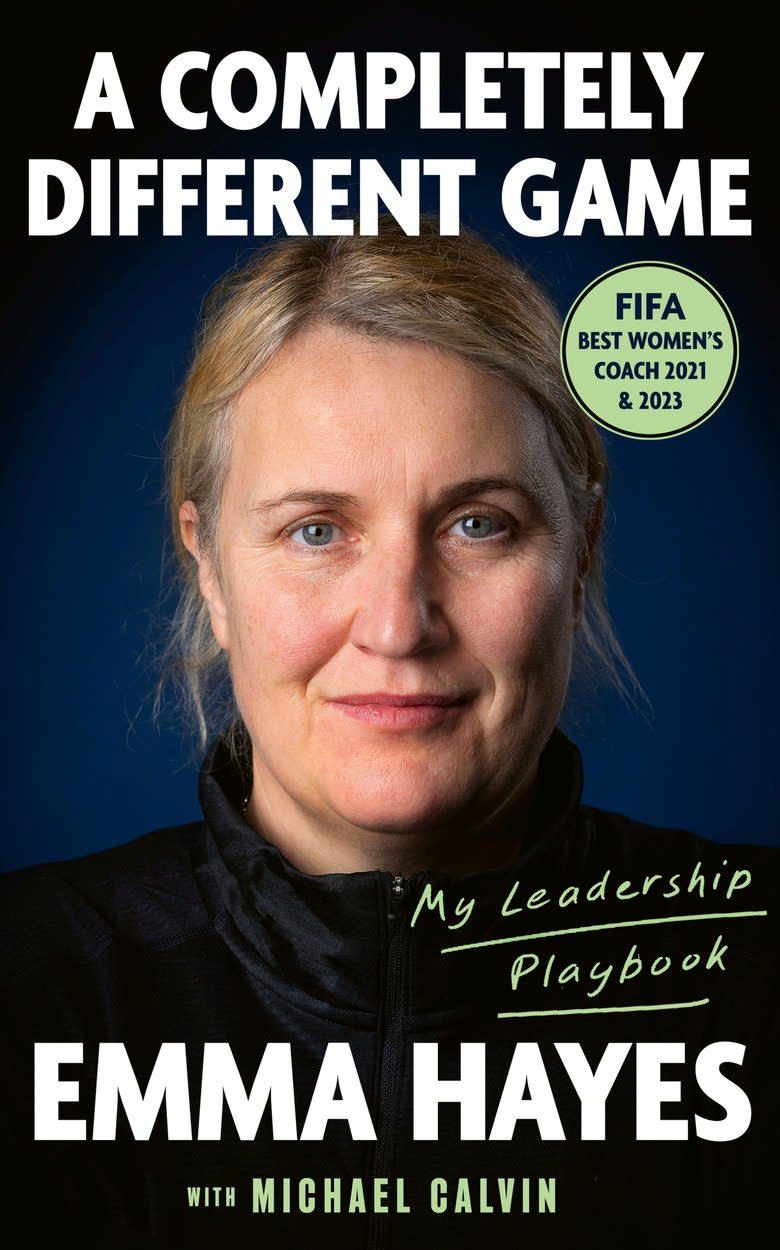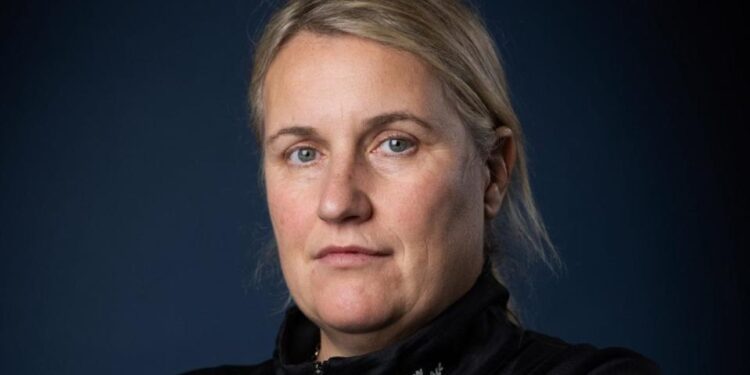
If life had worked out differently, Emma Hayes could have been the head of Britain’s spy agency rather than one of the most successful coaches in world football.
“I applied to MI5,” she writes in her new book. “But I didn’t hear back.”
It is one of many arresting lines that jump out from A Completely Different Game, which, typically, is also not an autobiography. “I wanted to do something I would read,” Hayes says. “I wouldn’t read an autobiography. I might read parts of it, but they are just not books I like.”
Instead she has produced a detailed guide to leadership, insights and lessons on how to be an effective and successful manager – applicable to any walk of life – but one laced with her own experiences. It makes it even more powerful and Hayes does not hold back. A word she uses is “visceral” to explain her “passion” and she does not disagree when I suggest it is intense and raw, as well as open.
“I am intense though,” Hayes says. “And light at the same time. I am actually a really chilled character. I am intentional, I would say. I think deeply about what I am trying to do and how I want it to have an impact. Not just on my team winning but the impact what I do can have on wider society.”
‘Ferguson texted me when we won gold’
Hayes certainly has a world view, which helps explain her interest in, well, being a spy. She was the first person from her extended family to go to university, studying at Liverpool Hope, and says: “When I think about how international relations, politics, sociology has played a part in my ability to lead people, I didn’t know it then, but I do now. It has been so instrumental.
“And, yes, would I deep down have loved to have been involved in diplomacy or international relations or negotiation skills? Maybe I was more suited to that than being a spy! But my mates at uni used to put a sign on my door saying ‘Jane Bond’.”
Hayes adds: “I have a passion for anything outside of England. I thrive in and enjoy understanding the world and the complexity around it. I have always been that way – I have studied the [people of] world’s largest stateless nation, the Kurds.”
Her inquisitive nature is similar to Sir Alex Ferguson’s – a great student of historical events, such as the American Civil War – and Hayes’s book is packed with references to the former Manchester United manager. There is evidently a bond. “I see so much of myself in him,” she says. “His was the first text I received when we won gold.”
Hayes won gold, of course, at the Paris Olympics this summer as head coach of the United States – the “pinnacle”, she says, of being a manager in women’s football.


“Coaching the US in the women’s game is like coaching Brazil in the men’s,” Hayes states, and there has always been that fascination with America, having spent 10 years there earlier in her coaching career and before she achieved such extraordinary success with Chelsea.
“I still get a lump in my throat thinking about it,” Hayes says of winning at the Olympics. “I fill up every time. I have dreamt about it. I have played that out on the pitches by the flats in Camden [on the Curnock Street Estate, north London, where she grew up].”
Olympics was ‘a way to smile after grief’
Hayes triumphed with the US just 73 days after taking her first training session. She inherited a squad who had tanked at the last World Cup but who, as ever, were burdened with expectation. There is a stark contrast in how Hayes felt physically and emotionally after succeeding in Paris and winning with Chelsea.
“I struggle to look at pictures of trophy lifts,” the 47-year-old says of her silverware-laden club career. Why? Hayes went through years of trauma – from the birth of her son, Harry, and the loss of his stillborn twin, Albie, to an emergency hysterectomy after a horrific battle with endometriosis that brought on a sudden menopause.
“The second trophy I lifted with Chelsea, 2015, that afternoon I had come out of hospital after an emergency procedure and all I see is the pain I was in,” Hayes says. “I remember the FA Cup in 2018, I gave birth to Harry 10 days later. I remember being in excruciating pain. Every image was of pain.
“That is why this summer was so joyful for me because I felt for the first time in a long time I didn’t have a personal health issue. It was also a way to smile after grief.”


The grief came with the death last September of her father, Sid, a larger-than-life character and a huge, encouraging influence in her life. Indeed the book opens with Hayes wrestling with whether, after 12 years, she should quit Chelsea to take the US job and a moment when she hears her deceased father’s voice encouraging her to seize the opportunity, something always implore her to do.
‘I suffered in silence’
Hayes is motivated to be so open about her health, and the effect it has had on her, to help others and “raise awareness”. She wants more dialogue and education and it is hard to argue when she asks “what if the plethora of underlying health issues around women’s menstrual cycles were experienced by men?” and answers her own question: “We wouldn’t be in this position. I really wanted to bring that to life.”
She has done just that. The book is striking. “When it comes to my own health I really reflected on how much I suffered in silence because I didn’t understand what was going on,” Hayes says. “And that’s why I dug a little deeper.”
Another clear theme is the huge, holistic investment Hayes has in her players and staff and their well-being which, on the surface, might well be at odds with elite sport. It is, she says, an “oxymoron” adding: “To be both caring and callous and cold all at once because you are in a business where these are people’s lives but you can only put 11 players in a team.”
And there are arresting lines that Hayes continues to throw out in the book, such as how she “normalised pain” and how her doctor told her that her endometriosis was so bad – stage five – it should have “crippled” her.
There is also the issue of whether it is feasible for a woman in her position – or, indeed, any position of responsibility and leadership – to take a year’s maternity leave.
“It’s the biggest regret I have,” Hayes says. “I took eight weeks and, as you often hear from women who have given birth, you are living inside a body that you don’t understand and are not in sync with and it takes you longer to recover from childbirth than you think. I thought, ‘Eight weeks, I will bounce straight back’. It took me about four years, but then I was dealing with chronic endometriosis, too. So, I don’t think that until I had the hysterectomy [in 2022] I ever recovered from giving birth.”


‘In the US, working in women’s sports is valued’
Understandably leaving Chelsea, as big a wrench as it evidently was and signing off with a dramatic Women’s Super League title win, felt right. As did taking over as US coach. “I was happy for my time at Chelsea to come to an end,” Hayes says. “Pressure comes with the position I am in and certainly comes with the winning history I have. I accept that.
“But I have enjoyed feeling joyful again. I didn’t realise how debilitating grief is and how much both grief and my own personal struggles of the last few years have really sapped me of everything. I am so happy to turn a page. Proud of everything I have done at Chelsea but happy to be in this new space.”


She has brought immediate success and expects to stay in the US post for five years, at least. “There is such a different vibe working in the US. Working in women’s sports is valued,” Hayes says, explaining how she feels re-energised.
But would she ever coach England? “I have always privately dreamt of coaching the US team and, yes, those formative years played a part in that,” she says. Hayes would “never say never” of coaching England but also says: “I haven’t necessarily seen the England path intuitively for me”.
‘Astonished’ by lack of diversity in management
What about the men’s game? Could she be a Premier League manager, for example? There is another line that jumps out from the book. “Who knows?” Hayes writes of what she might do next. “I may be so enriched by my experiences in international football that I enter the men’s game.”
So, is that her aim? “I just think people are asking the wrong person this question. You need to ask owners. Ask the question, ‘Why isn’t Emma Hayes or Carla Ward being hired at that level?’ Because I think whatever that ceiling has been, I don’t understand why that’s the case. I genuinely don’t understand in a world where if elite performance really, really matters diversity is essential. So why don’t we have it?
“I am not even referring to just gender. It’s race and ethnicity too. It’s across the board. I am almost astonished that an appointment hasn’t been made at some point for a female to be in charge, but as far as I’m concerned I’m really happy in the women’s game.
“Think about it from my perspective: how many jobs are going to be bigger than the one I have? So, I would have to give something up. Everyone talks about the men’s game but, I’m like, ‘do you realise what I am doing?’ This for me is the pinnacle.”
There is a goal, though, of where Hayes sees herself long-term and it is hardly a surprise given her entrepreneurial nature. “I want to invest in women’s sports,” she says. “Would I like to own a football club one day? Yeah, definitely. I want to invest in the women’s game and women’s sport and I see the potential in that.”
It is a potential that Hayes has played – and will continue to play – a significant role in growing. “I am doing something I love so I don’t think about achievements in terms of medals and winning things,” she says, despite her tangible success.
“For me, I just wanted to move the marker in the game and create a space that is a place and a great place for women to thrive in. I just feel really privileged to be given the chance to do it. That’s sometimes all that people need in life – to be given the chance.”


A Completely Different Game: My Leadership Playbook by Emma Hayes is out now (Robinson, £22)







